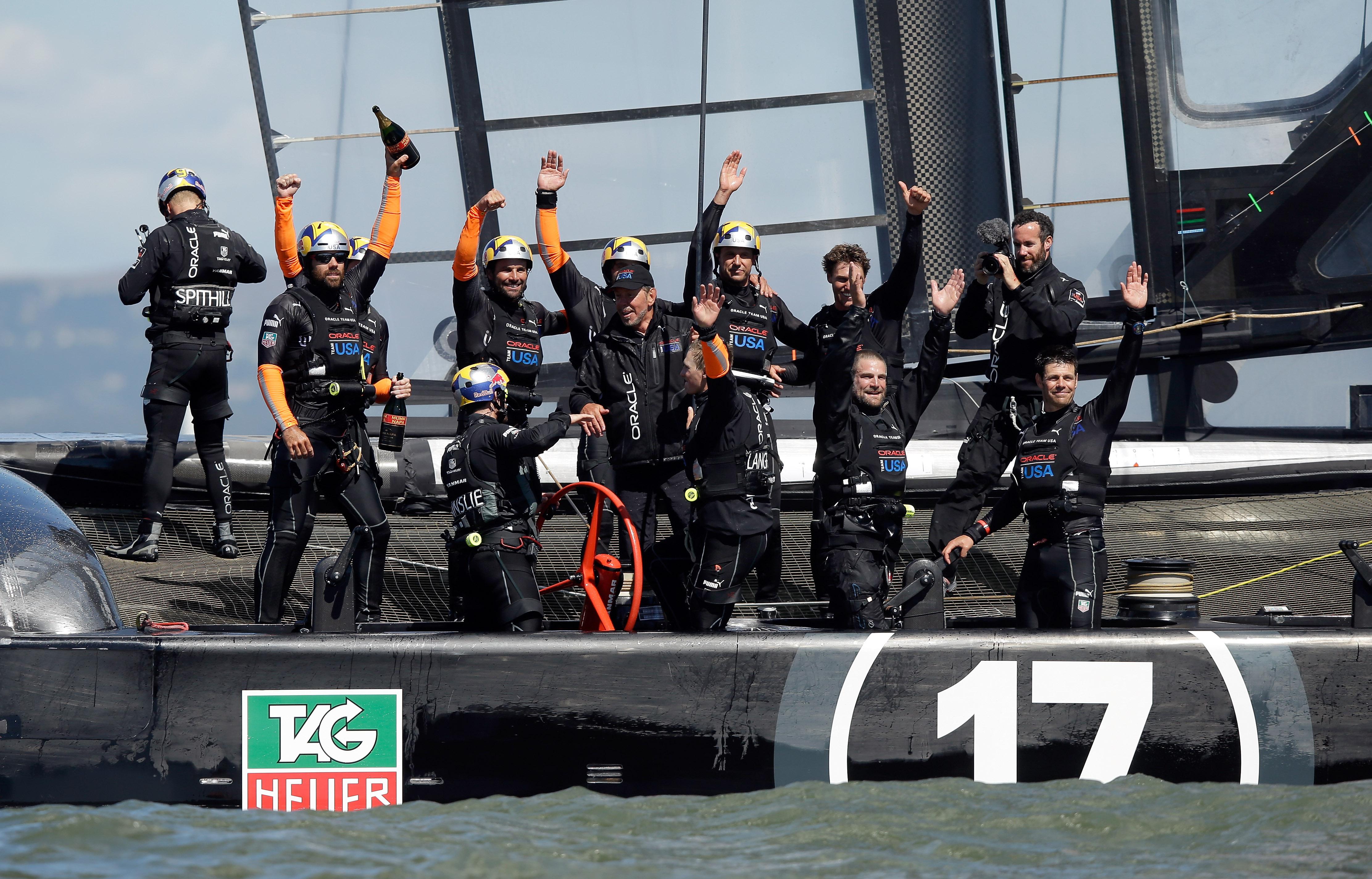On Wednesday afternoon in San Francisco Bay, a plucky squad of Americans finished off one of the most remarkable comebacks in modern sports history. Oracle Team USA dominated the final race of the 2013 America’s Cup to erase a seemingly insurmountable 8-1 deficit in the best-of-17 sailing contest. It was amazing. It was inspirational. There were boats.
OK, sure, the victors weren’t really Americans—Oracle Team USA has only one American sailor. And yes, “Team USA” would’ve won this thing several races ago if they hadn’t been docked two points for cheating by loading a boat down with extra weight in a preliminary event. Oh, also, this iteration of the America’s Cup stretched the definition of the word boat to include 130-foot-high catamarans that don’t so much glide across the water as levitate above it, threatening to capsize if some rope-pulling grunt takes a deep breath. In May, a British sailor died when one of these grotesque maritime playthings tipped over during an America’s Cup training run. But the sailing must go on, and it did, and Oracle Team USA fell way behind and then beat Emirates Team New Zealand, proving once and for all that the mercenary Kiwis who race monstrously expensive death boats for the good old Stars and Stripes perform better in the clutch than the Kiwis who race monstrously expensive death boats for the motherland.
The America’s Cup is the perfect contest for plutocrats. Rich people like to own sports teams, but are often frustrated that they can’t reshape the games they dabble in. (See Mark Cuban’s frequent tiffs with the NBA commissioner’s office.) In the world of big-time sailing, though, the rules are made to be rewritten. “When you win the America’s Cup, you get to decide pretty much all the details about how, where, and when you get to defend the trophy,” explained Grantland’s Katie Baker. When Oracle CEO Larry Ellison won the Cup in 2010, he decided that the sport needed to be faster and more exciting. He conjured a new kind of vessel that was outrageously expensive to construct, limiting the competition to whoever’s richer than the people who own private islands. (Because of course the biggest problem with sailing is that it’s too accessible to outsiders.) Imagine the owner of the Miami Heat decreeing, after his team hoisted the championship trophy, that basketball should be played on a diamond-studded trampoline with a ball shaped like a starfish. To the victor go the spoils, and the spoils are really weird and cost so much that almost nobody else can afford to play.
This was the background to the 2013 America’s Cup, which was shaping up to be the most unlikable sporting event since whenever Donald Trump last played a round of golf. And yet, somehow, this BattleBoats for billionaires was kind of great. Yes, Team USA barely had any Americans, and they kind of cheated, which led to them starting the best-of-17 contest with negative two points. (Negative two!) And Emirates Team New Zealand would have—should have—won the Cup if not for the absurd, unfair 40-minute time limit on races that robbed them of the decisive victory with the finish line in sight.
There’s really no rational reason for someone who isn’t from New Zealand and/or some type of robber baron to care even one bit about the America’s Cup, or to root for Larry Ellison and his team of sailing carpetbaggers. That’s why, more than any other race or match or game that I can recall, the 2013 America’s Cup proves that competition has the power to brainwash us, to make us forget all the discomfiting details floating in the wake of the world’s priciest pool toys and focus on the finish line, and the amazing feats being performed by those who are pushing to get there.
During the Olympics, we root passionately for athletes we don’t know who’ve trained their whole lives to reach the pinnacle of sports we don’t care about or understand. The America’s Cup will never reach that threshold of popular interest, no matter how much money Larry Ellison throws around to soup up his sailboats—a space-age catamaran is still a catamaran, and a catamaran is not helmed by Dale Earnhardt Jr. But no one, anywhere, can resist a great comeback story. Whether it’s basketball or sailing or thumb wrestling, it’s unthinkable to surmount an 8-1 deficit to win 9-8. This is exactly why sports are great—on a random Wednesday in the fall, sailing will become appointment viewing. And maybe in 162 years, it will happen again.
